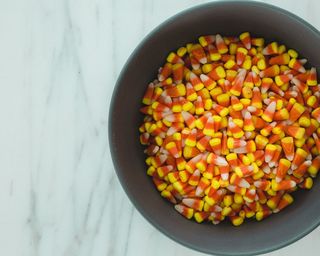Eating Disorders
Should Kids Eat Halloween Candy?
The power of non-restrictive eating.
Posted October 27, 2019 Reviewed by Kaja Perina

I remember when I was a kid, my mother insisted that we only buy Halloween candy that she didn't like, lest she eat any. Despite her not even liking the candy, it could not be brought into the house any more than 2 hours prior to the start of trick-or-treating, at which point the candy would be immediately put into a bowl and shut outside the front door.
When I would come home from trick-or-treating with my own sweet stash, my mother instructed me to hide it from her and told me that if she found it she would throw it away. So I kept it for months next to my bed, like a precious treasure, checking each day when I got home from school that my loot was still safe.
Let's just say that this did not lay the foundation for the healthiest relationship with food.
Now, as a mother to two young girls and as an eating disorder specialist, I vow to do things different. We know that restriction increases the risks for eating disorders, disordered eating, and all kinds of emotional issues around food. If we tell our kids (either verbally or non-verbally) that candy is bad, they will think that they are bad for eating it or even for wanting it. If we tell our kids that they can't have sweets, they will only want them even more, and often end up eating them in a way that feels out of control.
As parents raising children in a culture that demonizes sugar, we may be unsure how to manage candy around Halloween. This is a hot topic of conversation in parenting groups, where moms and dads share strategies ranging from eat-all-you-can-Halloween-night-and-then-toss-it-in-the-am to one-piece-per-day-until-it-runs-out-or-you-forget-about-it to "The Switch Witch" (yes, there is a product dedicated to getting the candy away from your kids). The general sentiment seems to be: if we don't restrict our kids access to candy, they are going to gorge themselves forever.
But is this really true? If given regular access to candy, do kids really eat candy all day every day?
I practice non-restrictive eating with my children. In our family, candy is fun, delicious, and a shared experience. We buy our favorites for Halloween and my daughter feels secure that candy--just like the other foods that she likes--is available to her on a regular basis.
Last week we bought two huge bags of Halloween candy from Costco, 2 weeks before Halloween. Yes, my daughter has asked to have some. "I have to make sure that it tastes okay for the trick-or-treaters" she told me, completely serious. Last night, she had a fun size Twix bar with her dinner. And, as I was cleaning up her plate, along with a few remaining pieces of carrot sticks and chicken pieces, was--wait for it--half the Twix bar. In disbelief, I thought to myself: who eats half a fun size candy bar? And then I realized who; a child who isn't restricted. A child who has regular access to candy. A child who doesn't have anxiety about where the next piece of candy is coming from, who hasn't debated with herself about what it means about her moral character or lovability if she eats or doesn't eat the chocolate. A child who was satisfied with a bite or two and probably forgot all about the remaining piece of candy because she has more important things to fill her 4-year old head with.
The paradox is, the more that we try to control our children's eating, the more out-of-control it all becomes. It's hard to trust that our children can self-regulate, especially in a culture that promotes a weight-based view of health and encourages dieting from the youngest ages. But I truly believe that, if we can provide some structure while also generally keeping out of their way, children know how to eat.


